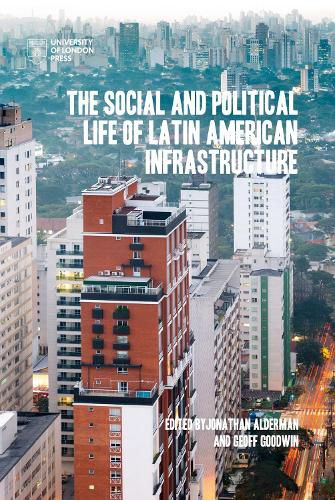Readings Newsletter
Become a Readings Member to make your shopping experience even easier.
Sign in or sign up for free!
You’re not far away from qualifying for FREE standard shipping within Australia
You’ve qualified for FREE standard shipping within Australia
The cart is loading…






From houses to roads, infrastructure provides a unique lens through which to explore social and political change. Serving as an important conduit between states and individuals, infrastructure provides governments with a powerful tool to mould citizens and control populations. Yet, at the same time, it also provides individuals and collectives with a platform to challenge the state and forge alternative forms of citizenship and politics. Infrastructure therefore often reconfigures social and political relations in unexpected ways and never dutifully follows the scripts of politicians, bureaucrats, and engineers.
Latin America provides fertile terrain to explore these issues. The region has been subject to extensive foreign intervention for centuries and much of its infrastructure has been primarily constructed to benefit colonial and imperial powers. Yet it has also been an important site of resistance, and infrastructure has been central to these struggles, including indigenous efforts to challenge capitalist-colonial expansion. Latin America’s history and diversity create unique infrastructure configurations, and the region’s remarkable geography adds to their distinctiveness.
This cross-disciplinary book seeks to capture the characteristics, limits and vibrancy of Latin America’s infrastructures. The empirical chapters explore a wide range of infrastructures, from irrigation networks in Peru to nuclear plants in Cuba. The introduction builds on these chapters to show the value of understanding infrastructure as a relational and experimental process. In doing so, the volume makes a novel contribution to global infrastructure debates and provides important new insights into Latin America’s history and politics.
$9.00 standard shipping within Australia
FREE standard shipping within Australia for orders over $100.00
Express & International shipping calculated at checkout
From houses to roads, infrastructure provides a unique lens through which to explore social and political change. Serving as an important conduit between states and individuals, infrastructure provides governments with a powerful tool to mould citizens and control populations. Yet, at the same time, it also provides individuals and collectives with a platform to challenge the state and forge alternative forms of citizenship and politics. Infrastructure therefore often reconfigures social and political relations in unexpected ways and never dutifully follows the scripts of politicians, bureaucrats, and engineers.
Latin America provides fertile terrain to explore these issues. The region has been subject to extensive foreign intervention for centuries and much of its infrastructure has been primarily constructed to benefit colonial and imperial powers. Yet it has also been an important site of resistance, and infrastructure has been central to these struggles, including indigenous efforts to challenge capitalist-colonial expansion. Latin America’s history and diversity create unique infrastructure configurations, and the region’s remarkable geography adds to their distinctiveness.
This cross-disciplinary book seeks to capture the characteristics, limits and vibrancy of Latin America’s infrastructures. The empirical chapters explore a wide range of infrastructures, from irrigation networks in Peru to nuclear plants in Cuba. The introduction builds on these chapters to show the value of understanding infrastructure as a relational and experimental process. In doing so, the volume makes a novel contribution to global infrastructure debates and provides important new insights into Latin America’s history and politics.